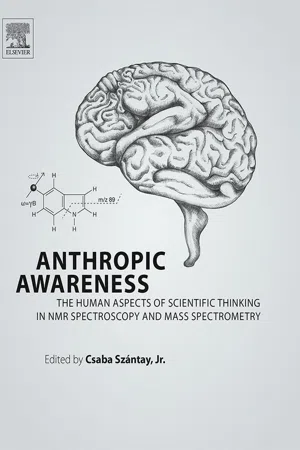
Anthropic Awareness
The Human Aspects of Scientific Thinking in NMR Spectroscopy and Mass Spectrometry
- 464 pages
- English
- ePUB (mobile friendly)
- Available on iOS & Android
Anthropic Awareness
The Human Aspects of Scientific Thinking in NMR Spectroscopy and Mass Spectrometry
About this book
Anthropic Awareness: The Human Aspects of Scientific Thinking in NMR Spectroscopy and Mass Spectrometry blends psychology, philosophy, physics, mathematics, and chemistry, describing a human-centered philosophy of the essence of scientific thinking in the natural sciences and in everyday life.It addresses the reasons why we are prone to make errors in our conclusions and how to avoid such mistakes, also exploring a number of the "mental traps" that can lead to both individual mistakes and mass misconceptions.The book advocates that by understanding the nature of these mental traps we can adopt tactics to safely evade them. It includes Illustrative examples of common scientific misunderstandings and mental traps in both the theory and real-life application of NMR spectroscopy and mass spectrometry.- Provides strategies on how to deal with molecular challenges and instrument limitations- Presents multiple applications of small molecule structure elucidation using NMR, MS, IR, and UV- Explores critical topics, including anthropic awareness (AA), NMR Spectroscopy, mass spectrometry, scientific thinking, and more- Includes tactics on how to Improve quality control and data interpretation skills while minimizing data analysis time and increasing confidence in results- Presents coverage on tactics to optimize experimental NMR parameters and enhance NMR vocabulary
Frequently asked questions
- Essential is ideal for learners and professionals who enjoy exploring a wide range of subjects. Access the Essential Library with 800,000+ trusted titles and best-sellers across business, personal growth, and the humanities. Includes unlimited reading time and Standard Read Aloud voice.
- Complete: Perfect for advanced learners and researchers needing full, unrestricted access. Unlock 1.4M+ books across hundreds of subjects, including academic and specialized titles. The Complete Plan also includes advanced features like Premium Read Aloud and Research Assistant.
Please note we cannot support devices running on iOS 13 and Android 7 or earlier. Learn more about using the app.
Information
The Philosophy of “Anthropic Awareness” in Scientific Thinking
Abstract
Acknowledgments
1.1 Introduction
Table of contents
- Cover image
- Title page
- Table of Contents
- Copyright
- Contributors
- Preface
- Editor’s Personal Acknowledgments
- Part I: “Anthropic Awareness (AA)” (Mind Your Mind!)
- Part II: AA in Why-Science: Examples from NMR Theory (If you Think you Know NMR, Think Again…)
- Part III: AA in What-Science: Small-Molecule Structure Elucidation by NMR and MS (Are you Sure you have Found the Correct Structure and not an Apparently Correct Structure?)
- Epilogue
- Index